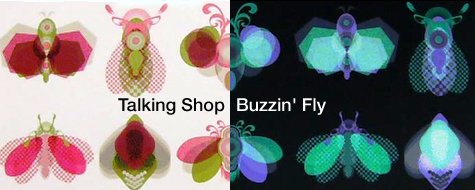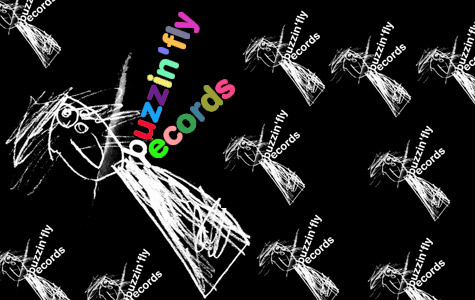
Welcome to the sixth edition of our series of short interviews affectionately titled Talking Shop. The majority of media and fan attention gets showered on the artists who create the music we love to listen to/DJ with/dance to, and for good reasons. But without the hard work, keen ears and business savvy of label staff, we’d be stuck only streaming tracks on Myspace. This time we’re shining the spotlight on UK-based creatures of the night, Buzzin’ Fly. After many years with the group Everything But the Girl, producer/DJ Ben Watt moved away from major label circles to have his own outlet for music. And thus, Buzzin’ Fly was born. Now in its fifth year, the label’s slick and steady flow of deeply-influenced tech-house has congealed into a UK powerhouse, providing vinyl homes for Justin Martin, Manoo, Jimpster, Rodamaal and Mlle Caro & Franck Garcia. Mr. Watt was kind enough to offer some very detailed answers about the future of music promotion, BF’s scratchy logo and his role as a “patron of the arts.”
Please tell me about the beginnings of Buzzin’ Fly. Why and how did you start out? How did you decide on the name Buzzin’ Fly?
As a teenager I was bewitched by the golden era of independents. I loved the whole ethos — the artwork, the look, the bands, the music, the badges. I coveted labels like Factory. I knew that one day I would try it myself. But a career as an artist got in the way for 25 years! Then, in 2002, I was DJing on the underground circuit. I made a club track for casual play at the club night I was running in West London. The track was called “Lone Cat.” I made 50 white labels for friends and DJs. Suddenly I was aware it had been bootlegged off the vinyl. It was in the racks at Blackmarket under the name “Watts.” I found out 2,000 had been made! I settled with the distributor, got the pressings stopped and put it out myself. That was the start of Buzzin’ Fly. I realised that I had a very strong idea of what I wanted in spite of being rushed into it. The name of the label was taken from a Tim Buckley song (just always loved the name), and I knew that to give the label an aesthetic would be against the grain for UK dance labels. The logo, the website, they were all chosen to be “unlike” a regular UK dance imprint. In the same way 3D and James Lavelle gave UK hip-hop a visual aesthetic, I wanted to do the same for house.
How did you select the artists for Buzzin’ Fly’s roster? Do you get many demos?
Selection is via a mixture of instinct and coincidence. I trust my ears and thanks moments of good fortune. Yes, we get tons of demos, and I try and listen to everything sight unseen. No prejudice. I found Justin Martin after his brother handed me a demo in a dark club in Miami five years ago.
What is one of your favorite releases on your own label? Why?
I love Manoo and Francois A’s “6 In The Morning.” It was their first single for us. Not a huge seller, but it summed up a lot of the sensibility within the label — that borderline between melancholy and volatility. Dance floor but emotionally moving. I also think it was a sound that predated much of the recent obsession with “deep-tech”… synthetic orchestration, the strong slow crescendo…
Audio clip: Adobe Flash Player (version 9 or above) is required to play this audio clip. Download the latest version here. You also need to have JavaScript enabled in your browser.
According to many doomsayers, running a record label isn’t one of the “smartest” fiscal things to do. How do you keep Buzzin’ Fly running with sales “as they are”?
Of course it is tough, but then it always has been. The history of independents is littered with financial failure, and even the success stories are usually built on the explosion of one band — New Order for Factory, The Smiths for Rough Trade, Franz Ferdinand for Domino, Oasis for Creation. So the realistic aim must be to be a break-even business with occasional success. Having made a good living out of music for 25 years I see myself in some ways as a “patron of the arts” these days!
Looking at it overall, in reality more people are consuming music than ever before these days, it’s just that no one wants to pay much or even anything for it any more. But there are certain costs that won’t go away — marketing, promotion and manufacture. It becomes harder and harder to balance the books. Yes, the digital age promises cheaper delivery costs but at what cost over all? I am looking at my recent iTunes purchases — Foals, MGMT, Joan as Policewoman — not to mention all my Beatport dance stuff — and I realise I have little allegiance to these people. I don’t know what they look like, what they stand for, what their world looks like. And loyalty and a feeling of kinship with the artist has been a cornerstone of the industry for years. So the problem going forward is how to correct the situation of people paying next to nothing for stuff they don’t really care about much and could happily walk away from. It is not going to be solved overnight.

Do you think mp3 blogs like mine hurt the music industry? Do you think blogs have a role in the future of dance music promotion?
Yes I do think they do damage when downloads are offered as opposed to streams. Some people try to liken blogs with dowloadable audio to pirate radio stations or the age of bootleg cassettes, but the problem is to do with the distribution potential. No one much minded when piracy was contained, but now the Internet gives the potential to disseminate vast numbers of tracks with absolutely no payback to the creator of that music. It is as if suddenly overnight Radio 1 and the entire TV and radio networks all over the world were suddenly allowed to play stuff for FREE. No PRS. No needle time. No publishing. The industry would collapse.
I believe in new legislation to protect the writers and artists. License fees or pay per play, even on the Internet. Or perhaps levies on the sale of MP3 players that goes back to the artists and labels. One of these methods has to be employed. Until then I would prefer to see more responsible blogging where streaming at lower res replaces free downloads, and bloggers put their own ego to one side and think about the repercussions. I once got a blogger to remove a freely downloadable Justin Martin track of ours. He said there had only been about 40 downloads of the track, so why did I worry. I pointed out that was $40 removed from the pocket of Justin Martin, which is what he was getting paid to bar-tending to supplement his DJ career. When I put it like that, the guy suddenly saw through it all. He removed the track and stopped giving away free tracks.
There is another argument that says bloggers are helping to “promote” the artist in the same way that labels give away free copies in the run-up to a release, but fails to realise that labels tightly control free goods so as not to impinge too much on real sales while still breathing a little oxygen into a project. Simply putting the track for free on the Internet is just inviting a free-for-all. It is ultimately unethical if it isn’t approved by the artist and the label. Ultimately, yes, blogging does have a major role to play in music promotion but only when done responsibly. The reason society got rid of the Wild West was that too many people were getting killed.
Audio clip: Adobe Flash Player (version 9 or above) is required to play this audio clip. Download the latest version here. You also need to have JavaScript enabled in your browser.
There is no shortage of labels in dance music. What does Buzzin’ Fly do after five years to stand out from the crowd?
Our aesthetic has very much helped. The handwritten Buzzin’ Fly font that appears on all our releases is actually now a bespoke font that we had designed for our exclusive use. Coupled with the visual eye of our designer, John Gilsenan, I feel that gives us an edge on the shelf. As for the music, I am aware of our sensibility and what people expect us to sound like, but I am also looking to stretch the boundaries of what is possible, hence releases like the Mlle Caro and Franck Garcia album that owed as much to Stereolab and Young Marble Giants and austere electro-pop as it did to modern dance floors. I respect labels like Warp and XL who have successfully merged genres within their catalogue. Flexibility, the moving target, these are the aims.
As technology advances further, vinyl is moving closer to becoming obsolete to many DJs. What are your feelings on this? Do you think the end of vinyl is in sight?
It will remain a niche market for diehards. It will end up like the 7 inch single for Northern Soul DJs. Hard-drive based DJing is the future whether we like it or not. Speaking as a musician I love the possibilities of DJing in the modern age: time-stretching, looping, portability, all these things are inspirational. As a fan I will always miss the heyday of vinyl, the sleeves, the smell, and standing trailing a piece of loo paper in front of the advancing needle trying to absorb pools of dripping condensation off the vinyl at a rammed and heaving Lazy Dog club night.
What are a few other labels you respect/revere most?
Stax, Sun, Blue Note, Island, Rough Trade, Sub Pop, Philadelphia International, Kompakt…
What can we expect from Buzzin’ Fly in the next year or so?
The future will be made by people we least expect and come from a direction in which we are not looking…
Buzzing Fly celebrated its five year anniversary with 5 Golden Years in the Wilderness, a three disc collection of classics, rarities and future tunes, released June 23rd.













[…] July 5, 2008 As I sit here on the couch on this lazy rainy Saturday afternoon, I have come across a very interesting interview with Ben Watt posted on Little White Earbuds, a music blog based in Chicago (I believe) that I am […]